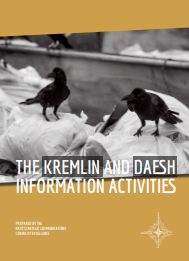THE KREMLIN AND DAESH INFORMATION ACTIVITIES
THE KREMLIN AND DAESH INFORMATION ACTIVITIES
Author(s): Antti Sillanpää
Contributor(s): Gregory John Simons (Editor), Anna Reynolds (Editor), Linda Curika (Editor)
Subject(s): Politics, Media studies, Communication studies, International relations/trade, Security and defense, Social psychology and group interaction, ICT Information and Communications Technologies, Peace and Conflict Studies
Published by: NATO Strategic Communications Centre of Excellence
Keywords: Russia; Kremlin; politics; information; communication; strategic communication; media; Daesh; social media;
Summary/Abstract: The paper summarizes discussions held on 24 May 2016 in Riga, Latvia, which focused on exploring the Kremlin and DAESH information activities in order to improve our understanding of the nature of these communications and their effect on Western societies. The questions discussed were: How are the communications and messages of DAESH and the Kremlin constructed and disseminated? Are their methods changing? Why do such messages appeal to youth, even if they are familiar with Western values and consumerism? What are the weakest aspects of our information environment and what can we do to improve? Six items emerged from the discussion as most relevant to the investigation of these issues. 1) Identity and Values Identity and values are in constant flux across time and space. It is easier to attack the values and identity of the other, rather than offering something different and better than the opponent. However, the West should be clear that it cannot simply assume the moral high ground. One of the weakness of the West is that we have allowed some members of society to become isolated and/or marginalised; they are now the ones who are more open and susceptible to the messaging of DAESH and the Kremlin, especially messages that project a sense of pride and/or a feeling of inclusiveness because they appear to offer the opportunity to participate meaningfully in some sort of utopian society. 2) Strategic Communications and the National Narrative There is a distinct need to create and maintain a positive national narrative in which words and deeds align, and to communicate that effectively. A narrative should not be static, but responsive to the environment in which it is based. One idea that came up in discussion was to task a specific governmental entity with coordinating messages concerning the national narrative and the strategic communication approach. This entity should be situated close to the Presidential Administration or the Prime Minister’s Office and have clear operating procedures, goals, and resources that address the identified risks and threats. The highest political backing would ensure sufficient clout to function adequately and carry out the mission. This body should oversee national narrative and strategic communication efforts, and act as an advisory and educational hub for other parts of government. A whole government approach, spanning both civil and military spheres, is required. The increase in the number of stakeholders reduces chances to create and manage coherent but relevant international narratives 3) Messaging and Counter-Messaging There is a continuing discussion as to whether the West should concentrate on counter-messaging or should focus on messaging instead. An argument for engaging in counter-messaging is that lies and harmful messages should not go unchallenged, otherwise falsehoods and partial truths may become accepted as facts and be assimilated into a society’s ‘knowledge base’. An argument against engaging in countermessaging is that this practice is likely to ensure that the West remains in a defensive and reactive posture in the current information confrontation, and adversaries’ harmful messages get unintentionally repeated. However, by actively messaging there is a chance to dictate the informational agenda, thereby forcing the opponent into a reactive position. Irrespective of the focus on messaging or countermessaging, information activities should not be done in isolation, but as an integrated part of a political or policy programme. 4) Perception and Legitimacy Emotional resonance holds greater sway than logical argument as a political or social relationship is formed between an audience and a communicator. Some individuals and groups are more susceptible to messaging than others, often as the result of an unfulfilled need. The motivation to join and/or support DAESH is largely based upon the perception that what is being offered is legitimate and will fulfil some psychological or physical need of the individual recruit. The messenger that communicates a believable response to such needs may well be able to influence that particular individual or group. However, when an individual personally experiences the dissonance between the projected utopia and reality, their trust in the utopian vision soon disappears, and along with it any sense of motivation or commitment to the cause. 5) Measuring Activity and Effect Both DAESH and Russia have adopted Western technologies and understood the audience appetite for infotainment and quick satisfaction. DAESH and the Kremlin employ the tactic of shifting focus and attention away from areas where they are losing or vulnerable. They have the ability to affect our news agenda and our focus through big event news. Even if the Kremlin or DAESH are engaged in harmful or disruptive communication, the activity does not necessarily translate into influence that would weaken the national security of the target state. The measure of an activity, i.e. communicating, does not automatically neatly translate into the measure of its effect, i.e. influence and change of behaviour. There are many variables that can either obstruct or facilitate the level of influence and persuasion that actually takes place when an actor communicates. These differences put pressure on us to achieve a better understanding of human behaviour and develop more meaningful ways of measuring. Observing, let alone measuring, the effectiveness of ‘hybrid warfare’ is particularly challenging. 6) Analytical Tools and Frameworks In addition to traditional historical area studies and social science perspectives, there are a variety of promising frameworks that can be used to investigate the information activities of DAESH and the Kremlin. The potentially fruitful approaches discussed included political and obstruction marketing and psychology.
- Page Count: 31
- Publication Year: 2016
- Language: English
- Content File-PDF
- Introduction

